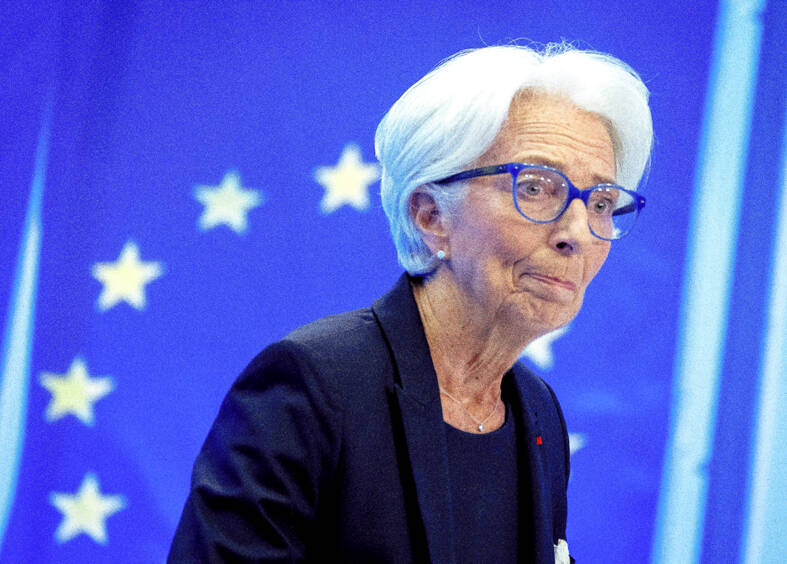The global economy could be headed for a new era of volatile inflation, making it even more crucial to anchor expectations for where prices are headed, central bank governors said yesterday.
Policymakers cautioned that hopes for a quick cooling in inflation pressures next year might prove premature.
More than a dozen central bankers gathered in a conference in Bangkok organized by the Bank of Thailand and the Bank for International Settlements.

Photo: AP
Climate change, geopolitics and shifting population growth mean prices might remain elevated for longer, they said.
That makes it even more crucial to hammer home a message to households and businesses that prices would be brought to heel.
The danger of allowing inflation expectations to become unanchored would be even more damaging, European Central Bank (ECB) President Christine Lagarde said.
“Given this exceptional uncertainty, what we central bankers have to do is actually deliver monetary policy that anchors expectations so those expectations remain moored to target,” she said on a panel discussion.
“We need to signal to the public, to the observers, to the commentators, that in all scenarios inflation will return to our medium-term target in a timely manner. This is the best we can do in the current environment,” Lagarde said.
All eyes are on the final ECB meeting of the year on Dec. 14, when officials are to decide whether to deliver a third straight interest rate increase of 75 basis points, or moderate the pace to half-point. In Asia, most central banks meeting on rates this month are expected to sustain monetary tightening.
Worries about enduring supply constraints peppered the discussions among officials.
Reserve Bank of Australia Governor Philip Lowe said central banks are facing their first test in a new world of more variable inflation.
“If inflation is going to be even more variable, it makes the credibility of monetary policy more important than ever,” he said. “We really need people to believe and understand that when inflation is away from target, which it will be more often, that it will come back.”
Central banks have aggressively raised interest rates this year in an effort to tame the worst inflation in decades. Prices are expected to ease next year due to slowing demand, falling commodity and food prices and favorable year-on-year comparisons.
“A preemptive, front-loaded and forward-looking interest rate response is very important to bring down inflation expectations,” Bank Indonesia Governor Perry Warjiyo said.
The consensus for price gains in Southeast Asia’s largest economy has cooled “swiftly” to 5.5 percent from almost 7 percent four months ago, thanks to policymakers’ aggressive rate hikes, he said.
“But we have, I would say, never faced such an important increase in global inflation,” Bank for International Settlements general manager Agustin Carstens told the conference. “The simultaneity of it is quite remarkable.”

PATENTS: MediaTek Inc said it would not comment on ongoing legal cases, but does not expect the legal action by Huawei to affect its business operations Smartphone integrated chips designer MediaTek Inc (聯發科) on Friday said that a lawsuit filed by Chinese smartphone brand Huawei Technologies Co (華為) over alleged patent infringements would have little impact on its operations. In an announcement posted on the Taiwan Stock Exchange, MediaTek said that it would not comment on an ongoing legal case. However, the company said that Huawei’s legal action would have little impact on its operations. MediaTek’s statement came after China-based PRIP Research said on Thursday that Huawei filed a lawsuit with a Chinese district court claiming that MediaTek infringed on its patents. The infringement mentioned in the lawsuit likely involved

Taipei is today suspending work, classes and its US$2.4 trillion stock market as Typhoon Gaemi approaches Taiwan with strong winds and heavy rain. The nation is not conducting securities, currency or fixed income trading, statements from its stock and currency exchanges said. Authorities had yesterday issued a warning that the storm could affect people on land and canceled some ship crossings and domestic flights. Taiwan Semiconductor Manufacturing Co (TSMC, 台積電) expects its local chipmaking fabs to maintain normal production, the company said in an e-mailed statement. The main chipmaker for Apple Inc and Nvidia Corp said it has activated routine typhoon alert

GROWTH: TSMC increased its projected revenue growth for this year to more than 25 percent, citing stronger-than-expected demand for AI devices and smartphones The Taiwan Institute of Economic Research (TIER, 台灣經濟研究院) yesterday raised its forecast for Taiwan’s GDP growth this year from 3.29 percent to 3.85 percent, as exports and private investment recovered faster than it predicted three months ago. The Taipei-based think tank also expects that Taiwan would see a 8.19 percent increase in exports this year, better than the 7.55 percent it projected in April, as US technology giants spent more money on artificial intelligence (AI) infrastructure and development. “There will be more AI servers going forward, but it remains to be seen if the momentum would extend to personal computers, smartphones and

Catastrophic computer outages caused by a software update from one company have once again exposed the dangers of global technological dependence on a handful of players, experts said on Friday. A flawed update sent out by the little-known security firm CrowdStrike Holdings Inc brought airlines, TV stations and myriad other aspects of daily life to a standstill. The outages affected companies or individuals that use CrowdStrike on the Microsoft Inc’s Windows platform. When they applied the update, the incompatible software crashed computers into a frozen state known as the “blue screen of death.” “Today CrowdStrike has become a household name, but not in